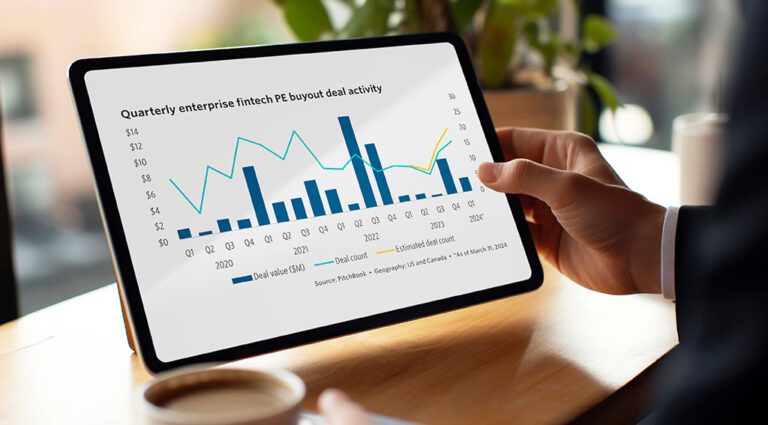Mid-market fintech and payments companies are gaining prominence in the broader fintech mergers and acquisitions (M&A) landscape, attracting the attention of private equity (PE) firms for their strong growth potential, stable profit margins and strong customer bases, according to a new analyst note from private market data provider PitchBook.
Mid-market fintech companies fall between small, early-stage startups and large, established companies in terms of size and maturity. These companies target mid-sized businesses or consumers and often specialize in specific products or services tailored to their target audience. They typically generate moderate revenues and have a moderate market presence compared to large fintech players, but still represent a significant portion of the overall fintech ecosystem.
According to According to PitchBook, mid-market fintech companies are increasingly attractive to larger companies, in part because of the relative ease of financing and executing deals in this sector. These companies have also performed strongly in a high inflation environment, making them attractive investment targets.
In Q1 2024, PitchBook recorded 16 PE buyouts of fintech companies, a notable increase from 11 in Q1 2023, the average of 11 buyouts per quarter in 2023, and the average of 14 per quarter in H2 2022. Of these deals, payments companies accounted for the majority (38%), continuing a trend seen over at least the past four years. Enterprise payments was the largest PE buyout segment in the previous 12 months (27%), as well as over the past four years (26%), the note said.

Payments companies are particularly attractive targets because of their ability to withstand inflation and maintain stable revenue streams, according to PitchBook. These companies provide a service that nearly everyone needs and benefit from robust consumer and business spending. Unlike software-as-a-service (SaaS) companies, payments companies charge their customers based on a percentage of each transaction rather than a fixed annual contract price. This model protects them from the negative effects of inflation and can even offer some advantages in such economic conditions, the note says.
Additionally, PitchBook points out that industry-specific payment tools, combined with workflow software, can generate the kind of revenue and margin growth that creates attractive buyout yields. acquisition of Jobox.ai by Talus Pay, a provider of payment processing solutions for small and medium-sized merchants owned by Alvarez and Marsal Capital. Jobox.ai specializes in payments and workflow software for home services. This acquisition complements Talus Pay’s existing focus areas, including healthcare, retail, restaurants, manufacturing and government.
Another example is the acquisition MuniciPAY by Autoagent Data Solutions in January. MuniciPAY operates as a citizen payment gateway for municipalities. Autoagent Data Solutions, known for its tax and government payment processing services, acquired MuniciPay to expand its citizen payment gateway, allowing local governments to consolidate their incoming revenues into one place.
According to the note, these companies, which combine payments and software, have a competitive advantage that is difficult for others to penetrate, as well as a loyal customer base, which makes them attractive targets.
Fintech M&A activity sees rebound
Looking at corporate acquisition trends, PitchBook’s note highlights a rebound in activity this year. In the first quarter of 2024, corporate acquisitions reached 18 deals, compared to 14 in the fourth quarter of 2023, their lowest level in four years.
The increase in corporate M&A activity during the quarter was largely driven by a more positive outlook from management teams. Until recently, corporate executives were facing challenges from slowing revenue growth due to fading stimulus measures. They were also expecting a recession due to rising rates and an inverted yield curve. However, the ecosystem has outperformed expectations, the report said.
During the quarter, large financial firms also actively acquired fintech companies to add new products and enhance existing offerings. JP Morgan, for example, bought LayerOne Financial announced in March that it would enhance its offering for hedge funds. The deal will allow clients of Neovest, a wholly owned subsidiary of JP Morgan, to monitor their portfolios, perform risk assessments, send orders to their brokers and perform compliance checks, all from a single platform, the companies said in a statement.
In the first quarter of 2024, corporate acquisitions in North America were concentrated in New York, San Francisco and other major cities, the note said. Many of these deals were for small businesses with five to 20 employees, indicating that companies continue to acquire talent and technology. The top segments in terms of deal count were financial markets (23%), CFO software (18%) and financial services infrastructure (18%).
Globally, the total value of fintech M&A deals announced in the first quarter of 2024 reached its highest level since the fourth quarter of 2021, totaling US$75.7 billion across 282 transactions, according to data from Financial Technology Partners, a fintech-focused investment bank. to showAlthough the number of transactions decreased by 11% compared to the first quarter of 2023, the overall volume increased by 7.5 times.
The increase in M&A volume was driven by a surge in $1 billion-plus M&A deals, which totaled 11 in the first quarter of 2024, compared to just two announced in the same period last year. These large deals included Capital One $35 billion acquisition project Discover Financial Services, KKR’s purchase of a 50% stake in Cotiviti at a price Valuation of 11 billion US dollarstrading platform Webull signs $7.3 billion merger deal with special purpose acquisition company (SPAC) SK Growth Opportunities and Nationwide Building Society Virgin Money acquired for $3.7 billion.

This article was first published on fintechnews.am
Featured Image Credit: Edited from free pic


